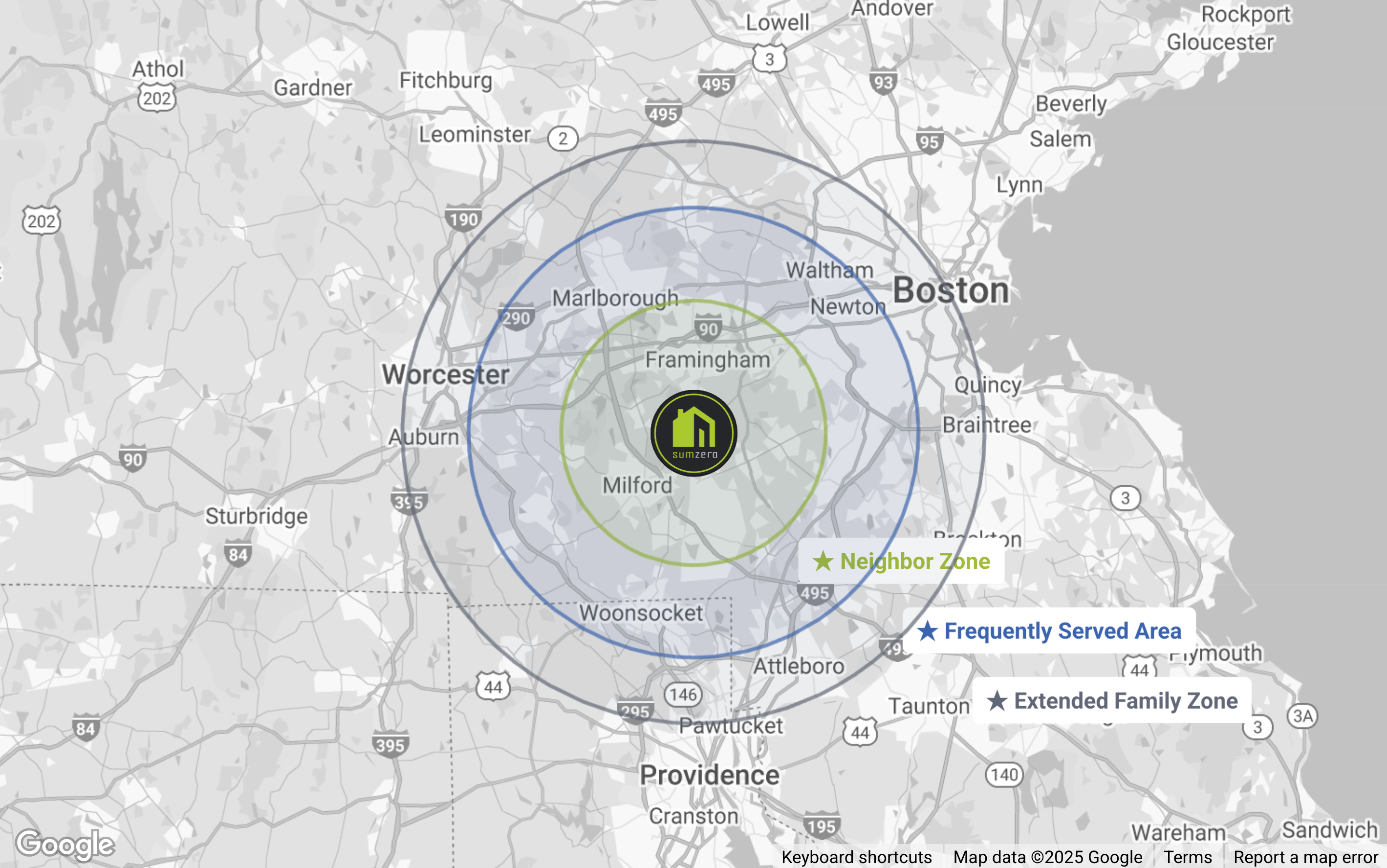Energy Recovery Ventilators | Lincoln, MA
Energy recovery ventilators in Lincoln, MA are advanced systems that exchange stale indoor air with fresh outdoor air while capturing energy to maintain temperature balance and improve efficiency. Our ERV systems and whole-house air exchangers provide smarter home ventilation solutions that enhance indoor air quality and lower energy costs year-round.


Why Home Ventilation Matters in Lincoln, MA
Lincoln, Massachusetts, is known for its beautiful open spaces, colonial-style homes, and four-season New England climate. While residents treasure the charm of older homes and the cozy feel of tightly sealed modern constructions, these features can also create serious challenges when it comes to indoor air circulation.
Winters bring sealed windows and heavy insulation, while the humid summers can quickly lead to stale air and moisture buildup. These conditions lead to poor air quality control, elevated humidity, and increased pressure on HVAC systems. Without proper ventilation, allergens, indoor pollutants, and lingering odors can accumulate, compromising your health and comfort. That’s where a high-performance Energy Recovery Ventilator (ERV) becomes essential for Lincoln homeowners.
“In a climate like Lincoln’s—cold winters and humid summers—an ERV system doesn’t just improve comfort, it protects your home’s efficiency and your family’s health.”
Energy Recovery Ventilators: Ideal for Lincoln’s Climate
What Is an Energy Recovery Ventilator?
An Energy Recovery Ventilator, or ERV, is a mechanical ventilation system that brings fresh outdoor air into your home while expelling stale indoor air. Unlike standard ventilation, an ERV transfers heat and moisture between the two air streams, reducing energy waste. The result: improved air quality without sacrificing comfort or energy efficiency.
In regions like Lincoln, where outdoor air varies dramatically between seasons, an ERV helps regulate indoor temperatures and humidity levels year-round. This enhances overall home energy efficiency while controlling pollutants like VOCs, mold spores, and pet dander.
Seasonal Advantages of ERV Systems in Lincoln-MA
Installing an ERV offers clear seasonal benefits tailored to Lincoln’s weather:
- During winter, incoming cold air is pre-warmed by outgoing air, reducing heating demands.
- In summer, the humid air coming in is dehumidified by interaction with your cooler indoor air, reducing reliance on dehumidifiers or AC-high strain.
Why ERVs are Better Than Traditional Venting
Traditional vent systems often release conditioned air directly outdoors, wasting energy. ERVs retain valuable thermal energy and moisture, making them ideal for Lincoln’s climate. When considering ERV vs HRV, note that while both systems exchange air, ERVs have an added advantage in maintaining humidity balance—especially important for Lincoln’s dry winters and humid summers.
“ERVs perform especially well in Massachusetts’ mixed-humid climate. They keep energy bills in check while allowing you to breathe easier every season.”
ERV Systems That Suit Lincoln-MA Homes
Matching ERV Systems to Home Types in Lincoln
Whether you live in a classic Colonial or a newer energy-efficient build, there’s an ERV system designed to seamlessly integrate with your home’s architecture. Older homes in Lincoln may need retrofitting solutions, while newer homes are often tight-sealed and require mechanical balanced ventilation by design.
A proper assessment by HVAC professionals ensures ductwork compatibility, ideal installation locations, and optimized airflow for your household.
Integration With Existing HVAC Units
Most modern ERVs are designed to work with existing HVAC systems, meaning they can function as part of your central air setup. When installed properly, they help reduce operational strain on heating and cooling equipment—boosting long-term home energy efficiency while enhancing comfort levels.
Custom Sizing & Professional Installation
A system that’s too small can’t adequately ventilate your home, while one that’s oversized wastes energy. Proper ERV sizing is based on square footage, occupancy, and insulation levels—factors especially variable in Lincoln’s unique housing stock. Professional installation also ensures minimal air leakage and optimal system performance.
Home Ventilation Systems: Clean Air, Quiet Comfort
What Makes a Home Ventilation System Complete?
A complete home ventilation system combines air circulation, filtration, and exchange. Components such as duct boosters, inline fans, and humidity control units complement your ERV to address every facet of air hygiene. For Lincoln homes, the goal is to maintain healthier indoor air while preserving thermal comfort during hot summers and frigid winters.
Indoor Pollutants in Massachusetts Homes
Common indoor air pollutants in Lincoln homes include:
- Combustion byproducts (from fireplaces or gas cooking)
- Radon (natural to the region’s geology)
- Pet dander
- Pollen and mold spores (especially during transitional seasons)
An ERV system efficiently exchanges and filters this air, reducing respiratory irritants and enhancing daily comfort. Households with members that suffer from allergies, asthma, or chemical sensitivities will see noticeable improvements.
Balanced Ventilation and Its Role in Well-being
Balanced ventilation is a method where the air coming in equals the air going out. This prevents pressure imbalances that can pull in contaminants from attics, basements, or crawl spaces—an especially important factor in multi-story homes or those with complex duct configurations common in older Lincoln properties.
"Balanced ventilation with energy recovery not only promotes health but also defends your home against moisture-related damage, mold, or rot—common problems in New England homes."
Whole-House Air Exchanger Benefits for Lincoln Homeowners
ERV as a Whole-House Solution
A whole-house air exchanger can dramatically improve your indoor air quality, temperature control, and moisture levels—especially important in Lincoln's variable seasons. ERVs can be ducted throughout the home or zoned strategically to target high-use areas such as kitchens, bedrooms, and basements.
Energy Savings Make It Worthwhile
Integrating a whole-house ERV system reduces load on your furnace and air conditioner. Less energy is needed to condition fresh air, because ERVs temper it naturally during the exchange process. Over time, this leads to measurable energy savings without sacrificing airflow or comfort—a big plus in Massachusetts, where utility costs can be steep.
Additionally, installing qualified ERV systems may make you eligible for rebates through programs like Mass Save, which promotes home energy efficiency upgrades.
Maintaining Your System for Long-Term Value
ERVs require minimal upkeep but regular maintenance:
- Clean or replace filters seasonally
- Check the core for dirt or mold buildup
- Inspect ductwork and connections annually
Homeowners in Lincoln should consider scheduling regular tune-ups, especially before winter and summer peaks. Long-term reliability is one of the most rewarding attributes of ERVs, making them a smart investment.
Choosing ERV vs HRV: What's Right for Your Lincoln Home?
Understanding the Main Differences
The key distinction between ERV vs HRV comes down to humidity control. Both ventilate, but ERVs also transfer moisture between airflows—essential in Lincoln's humid summers and dry winters. This makes ERVs the preferred solution for year-round comfort in the New England climate.
HRVs may be ideal in frigid, dry zones, but they don’t perform as well in mixed-humid conditions like we see in Massachusetts.
Climate Compatibility
Lincoln experiences a mix of hot, humid summers and cold, dry winters that demand comprehensive moisture and temperature regulation. ERVs manage both, leveling humidity internally so your HVAC doesn’t have to work overtime. For homeowners in 01773 and surrounding ZIPs, it’s the optimal choice.
Building Codes and Rebates
Massachusetts has strong building efficiency codes that encourage inclusion of mechanical ventilation systems in new construction and major renovations. ERV systems easily comply with building code ventilation requirements and may qualify for local or state incentives aimed at sustainable building practices.
ERV Systems in Lincoln: Smart, Sustainable Ventilation
Supporting a Healthier Indoor Environment Year-Round
With four distinct seasons and diverse housing stock, Lincoln homeowners need solutions that adapt to changing temperatures and humidity conditions. ERV systems provide consistent, clean, comfortable air circulation no matter the season—supporting indoor wellness and HVAC performance alike.
Eco-Conscious Living in Lincoln
The town of Lincoln, known for its conservation land and eco-minded community, is a natural fit for sustainable home technologies. ERVs represent a responsible step toward reducing carbon emissions and preserving resources, all while enhancing personal comfort. For homeowners committed to greener living, it’s a practical and impactful choice.
A Long-Term Investment in Home Efficiency
ERVs aren’t just about short-term comfort; they’re an investment in the durability, efficiency, and resale value of your home. As energy costs rise and indoor air quality becomes even more important to buyers, having a professionally installed ERV sets your home apart.
By improving air quality control, supporting balanced ventilation, and increasing home energy efficiency, your ERV system delivers long-term value tailored to life in Lincoln-MA.
What Local Homeowners Are Saying
See how SumZero has helped local homeowners stay comfortable year-round with energy-efficient heat pump solutions.
Not Sure Where to Start? We’ll Guide You
Let our experts design the right heating and cooling solution—customized for your comfort, your layout, and your energy goals. No pressure. Just clarity.
Request FREE ESTIMATE









